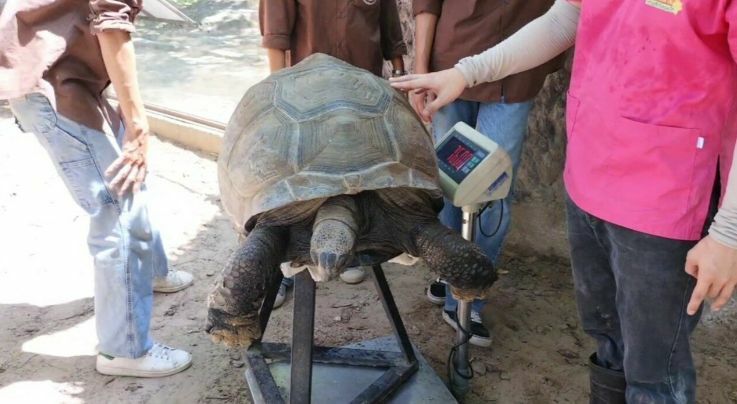Khon Kaen zoo conducts health check on giant turtles as breeding season ends

Khon Kaen Zoo conducted health checks on various species of tortoises and turtles in preparation for their egg-laying season after the completion of the breeding period. Some of the tortoises weighed over 70 kilograms, yet maintained good health.
Khon Kaen Zoo has been focusing on the breeding and conservation of various species of tortoises, including the Aldabran giant tortoise, with two in captivity, alongside 26 Sulcata tortoises and four yellow or Radiated tortoises. Apart from these, the zoo also has 50 aquatic turtles, which include leaf, softshell, and red-cheeked turtles. The breeding season starts around February and lasts until May and is followed by the egg-laying period.
Narongwit Chotchoy, the director of Khon Kaen Zoo, revealed that the zoo conducts yearly health checks on the tortoises, adhering to wildlife animal health guidelines reported Khaosod. These annual checks involve administering anti-parasite medication, measuring the tortoises’ weight, and updating their records, contributing to the individual tortoise’s statistics within the zoo.
Weighing some of the tortoises can prove to be quite a challenge, as certain species, like the Aldabran and Sulcata, can weigh around 70 kilograms. These health inspections aim to ensure that the zoo’s resident tortoises maintain good health. The tortoises remain a major attraction at Khon Kaen Zoo, especially for children and visitors.
While the turtles and tortoises at Khon Kaen Zoo are being treated well, many species of turtles, particularly sea turtles, are listed as critically endangered in Thailand.
Only one in 1,000 sea turtle hatchlings is thought to make it to adulthood. Without guidance, many hatchlings die from dehydration because they don’t make it to the ocean fast enough. In Thailand, park rangers play a crucial role in protecting sea turtle eggs and hatchlings. Rangers often move eggs they find to safer spots and help to safely guide hatchlings into the sea.
Latest Thailand News
Follow The Thaiger on Google News:


























